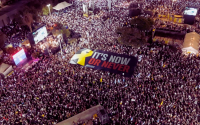20 February 2008
Some cling to power to the last; some are overthrown, and some have the good sense to know their time. Fidel Castro is an autocrat who, at 81 and in poor health, has just squeaked into the group of graceful farewells. In a message published in the press he, until recently, controlled, he announced he would not be standing again for office. Put more bluntly, Mr Castro has resigned after almost half a century as the Communist dictator of Cuba. Not only for that country but, for the rest of us, a distinctive era has closed.
Mr Castro has staged his departure in several acts. He submitted his provisional resignation at the end of July 2006, when he was about to undergo surgery, and he handed temporary power to his younger brother, Raul. In an open letter last December, he hinted that the future lay with younger leaders. In his latest message he said that he was in no physical condition to resume his leadership responsiblities. We will know after Cuba's National Assembly opens on Sunday whether Raul is to succeed his brother, or whether the baton will pass to a new generation.
Raul Castro would inevitably be a transitional figure. He could be expected to continue, perhaps even accelerate, the tentative liberalisation he has begun. For the really dramatic changes – a move towards embrace of the free market, an opening to the world outside, and acceptance of the investment that is just waiting to flood in from outside – the long-suffering Cubans will probably have to wait a little longer. Yet it could be months, rather than a generation.
The past 20 years have shown that repressive regimes are often more fragile than they look; that one serious shock, or the departure of one key figure, can cause the whole seemingly solid edifice to collapse. And with George Bush leaving office next January, and the US preparing to elect a less ideological leader, the times are as propitious as they could be to ease Cuba's return from its half-century of isolation.
To the Cubans in US exile, impatiently urging a new revolution from the sidelines, Fidel Castro's resignation promises nothing less than the release of their beloved country from dictatorship. Mr Castro's legacy, however, is more complicated than this. His regime was cruel and stultifying in many ways. Dissidents were purged by imprisonment or dispatch to exile. Individual rights and freedoms were – and remain – severely circumscribed. Cuba may have opened up its island to limited tourism (a move necessitated by the country's bankruptcy when Soviet patronage ceased), but Cubans are not free to meet or travel either for real, or even virtually, via the internet.
At the same time, as is frequently observed, health and literacy standards are impressive by international standards. Fidel Castro had a model for Cuba's development, and he pursued it single-mindedly. For very poor Cubans – the majority – Communism was not the unalloyed blight it was in more developed countries elsewhere. Behind the barricades and the fierce anti-Western rhetoric, Fidel Castro brought a measure of social progress.
In later years, however, he was a leader conspicuously outpaced by the times, atrophied in the categories of class struggle and the Cold War. As such, however, he came to seem less threatening, for all the needless deprivations suffered by the population. With his fatigues and trademark beard and cigar, he had presided long enough to see Communist Cuba return as retro-chic. Curious outsiders, we forecast, will now rush to see Fidel's Cuba before it passes. We hope they go with open eyes: for the positives, but also for the many, many negatives which Cuba will be so much better off without.






